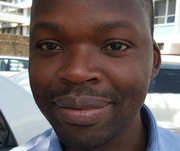Researcher of the Month: Save Kumwenda

Save Kumwenda
Welcome to the first of SHARE's Researcher of the Month series! Each month we'll be interviewing one of our current or former researchers and finding out a bit more about their work. First up is Save Kumwenda, Research Fellow at the University of Malawi - Polytechnic, who is working on the Integrating WASH and Food Hygiene project.
Before I joined SHARE I was teaching and I also had a fellowship with the Consortium for Advanced Research Training in Africa (CARTA), where you go to different countries for capacity building. The first year, I went to Tanzania for one month, then South Africa for a month. For the second year, I concentrated on my studies and then in the third year I went to Nigeria for a month. In the final year, I went to Kenya for a month, and attended a workshop where facilitators from all over the world taught me different skills. I’m supposed to finish the PhD in March this year. Rather than writing a thesis, I’ve decided to do it by publication, so now I’m waiting for them to be published before I finalise my PhD.
What are you currently working on?
After I joined SHARE in December 2016, I was catching up on reading and attended the partners meeting to present an update. From there, I’ve been trying to work on the research – looking to recruit research assistants, interviewing them and supervising one of the Masters students. Recently we’ve been training, and we have starting pre-testing in the field.
What are your plans for the next few months?
Once people are in the field I will pull back and focus on linking up with people in the ministries, visiting them, so they know our RIU plan and they are aware of our work in advance.
I’m also planning to do a capacity building activity. After the data collection will come the data analysis. I aim to identify someone doing statistics at Malawi-Liverpool-Wellcome and see if they have time to go through some of the key areas related to our research. Then I’ll come back and teach the SHARE research team, so everyone is updated when we start looking at the quantitative data.
What made you interested in this area of work?
My interest started a long time ago. As an environmental health person, I realised there are many different forms. I’ve worked in occupational health and safety, but later on when I started working in WASH I found that there are also a lot of issues, and it’s often easier to make an impact in this area. When you go to communities, you find that issues of health and safety are not there, but they are not as big a problem compared to the WASH issues. So I thought I should concentrate on WASH, and I worked on my Masters project on water treatment issues and water storage at household level.
What do you find challenging about your research?
When you are working in sanitation, it’s difficult to get people to change and start doing things in different ways. You have to get people to do things many times before they start changing their behaviours. Getting people to change their behaviour to avoid mosquitoes and reduce malaria is comparatively easier in my opinion, but for sanitation issues it’s a bit difficult to do that.
There also aren’t many experts in sanitation in Malawi. People working in this area are often implementers, but if you are talking about the science of sanitation, there aren’t many experts which is a challenge.
Do you think your research will impact policy?
I’m sure it will have an impact on policy. We are looking at food hygiene and WASH, and the government is interested in reducing the diarrhoeal disease in under 5s as they have realised it’s the backbone for someone to have a good life, as it affects intelligence and growth. If we can demonstrate the impact of this project I think they will be interested in using it in policy.
If there was one thing you could change about your research, what would it be?
That’s a difficult question! I think the interaction between researchers and policymakers and changing the mindset of policymakers towards research. That’s the major problem. If you go to policymakers, they often think you do research only for academic purposes, but not to affect polices. Maybe we can find ways of changing that. It’s also important to change researchers’ mindsets, as they might do research for one purpose – to complete their studies or to publish their work. So changing both sides is important.
What advice would you give to someone starting out in this area?
My only advice would be they shouldn’t come with pre-existing ideas. People often come into WASH thinking it’s only hygiene and water supply – these are simple things that are straightforward. You might not be successful in this field if you come in with that mindset. I would advise them that it’s not as simple as they think. If you start thinking deeper and get more experience, it becomes a bit complicated.
